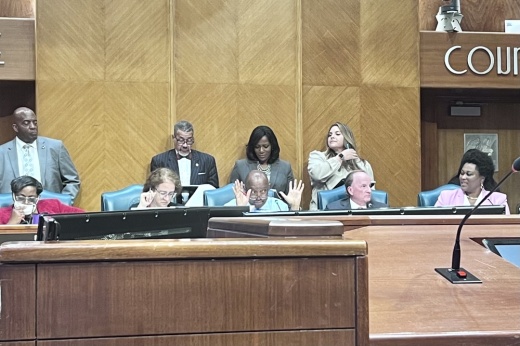Editor's note: This article was updated to correctly state the outcome of at-large council member Sallie Alcorn's Solid Waste amendment.
After hours of discussion, Houston City Council approved a $5.7 billion budget for fiscal year 2022-23 during a June 1 meeting. At-large Council Members Mike Knox and Michael Kubosh were the only members to vote against the budget.
As previously reported by Community Impact Newspaper, this budget is an increase of $487 million, or 9.3%, in expenditures from the previous year. Similar to last year’s budget, $160 million in American Rescue Plan Act funds will be used for revenue replacement. The general fund budget was approved at $2.7 billion, a spending increase of $102 million, or a 3.2% increase, from the previous year.
During the vote for the budget, District C Council Member Abbie Kamin emphasized the importance of remembering the city is under financial constraints that are not sustainable. She said city departments, such as fire, police and solid waste, need more money all around.
“Without those ARPA dollars, we would continue to be in big trouble,” Kamin said.
While going through the amendments, Mayor Sylvester Turner said he felt his leniency in the past years was abused. This year, he stressed the importance of how amendments are to be made. When a council member made an amendment, they were required to show they would pull money from one fund and allocate it to another.
The council discussed 106 amendments, about 40 of which came from District A Council Member Amy Peck. Ultimately, only 16 amendments passed.
Amendments that passed included two from District G Council Member Mary Nan Huffman, at-large Council Members Sallie Alcorn and David Robinson, and Peck. Amendments provided an increase in revenues for expenditures in the Building Inspection Special fund by $500,000 by adding an expedited review service for the Office of City Engineer at the Houston Permitting Center and an increase in expenditures in the same fund by $300,000 to implement improvements within the process at the Houston Permitting Center.
Public safety
The increase in the general fund can be attributed in part to the 6% pay increase for fire fighters, 4% increase for Houston Police Department officers and 3% increase for municipal employees. As previously reported by Community Impact Newspaper, pay raises have been approved for the next three years, by which time firefighters will receive an 18% increase, police officers will receive a 10.5% increase and municipal employees will receive a 9% increase.
At-large Council Member Letitia Plummer attempted to gain more money for firefighters but failed to do so due to the rules of the city charter that do not allow City Council to dictate where a department spends its funds.
“I don’t think we can do this for anybody,” Knox said. “We can’t sit around and dictate to a department head how to spend their money.”
The amendment would have given every firefighter a one-time hazard pay allocation of $3,000. According to Plummer, firefighters have performed their essential public safety work well despite the pandemic.
During the June 1 public session, Marty Lancton, president of the Houston Professionals Fire Fighters Union, spoke in support of the amendment. He said the morale is the lowest he has ever seen it and that the pandemic added “dangers onto an already dangerous profession.”
Another amendment for firefighters introduced by Peck passed. The amendment will “explore the financial and other benefits of hiring retired firefighters or contracting with other trained individuals to conduct fire inspections.” This amendment will save the city money and will free firefighters to handle other matters, Peck said.
An amendment proposed by District K Council Member Martha Castex-Tatum will explore the financial costs of using up to 10 code enforcement officers for a weekend program. She said although police officer retention is low, it is low mainly for weekdays. She said this program will protect neighborhoods while attracting people for work because it will give those who work weekdays an opportunity to make more money.
A public safety amendment from Plummer also passed. Through her amendment, the city will consider funding salaries to hire eight habitability inspectors. Under the amendment, these inspectors will be able to go inside to inspect the interior of apartments. Currently, inspections involve looking at the exterior.
“I have waited a year for this," Plummer said. "People are struggling right now.”
Following the vote, an ordinance was passed to allocate $28.5 million from the general fund to the Houston Forensics Science Center. The HFSC works to prevent backlog, reduce error rates, improve progress for evidence and work with HPD’s officers for handling narcotic evidence. According to Turner’s One Safe Houston plan, fixing the forensic backlog can help with the overall backlog issue and keeps violent criminals off the streets.
Environmental finances
A common issue brought up at public sessions related to the Solid Waste Management Department. At past Greater Heights Super Neighborhood Council meetings and Super Neighborhood No. 22 meetings along the Washington corridor, residents have brought up their frustration with not knowing whether their trash will be picked up on time.
Through a passed amendment from Council Member Robert Gallegos, the city will study and determine a cost for residential refuse service and recommend a new cost for the city to establish a new service. The city will also review the Houston Solid Waste Management Department’s program and determine if a “reimagined, on-demand service” would be cost effective, reliable and sustainable.
With a third passed amendment, the SWMD will also study the feasibility of continuing waste collection services at “single-family dwellings.” This will allow them to have the option to continue services to smaller apartment communities, Gallegos said.
The department will report on the findings to the Quality of Life Committee, which is chaired by Gallegos, in 180 days.
An amendment from Alcorn for the SWMD was discussed, but was not supported by the administration. It would have increased funding “by drawing down dollars from the fund balance or establishing a monthly solid waste user fee for residents with city trash service.”
Gallegos, who co-authored the amendment, said it is time the city take care of the problem.
Other passed amendments include three from Peck that will explore financial benefits for installing artificial turf at library grounds and sharing mowing duties for libraries, esplanade and multipurpose center grounds. The Houston Public Works Department will explore the potential financial benefits for taking over mowing along major thoroughfares.





